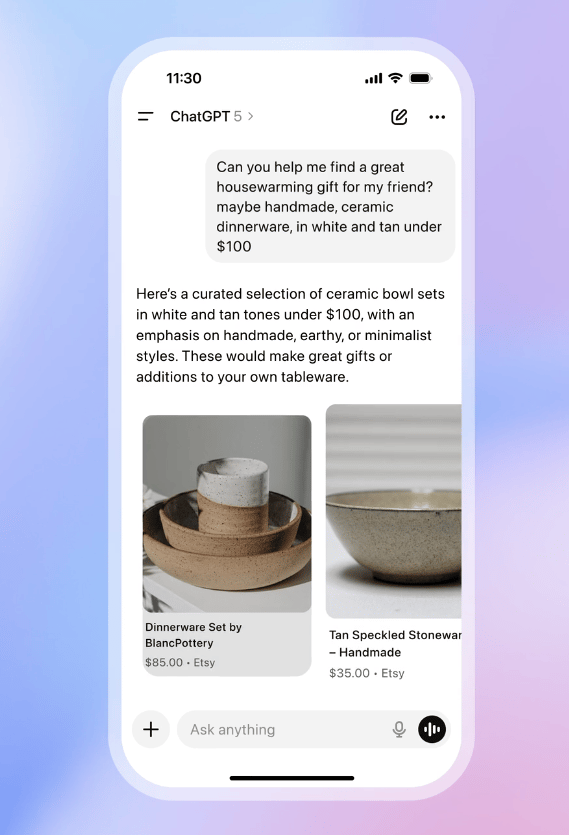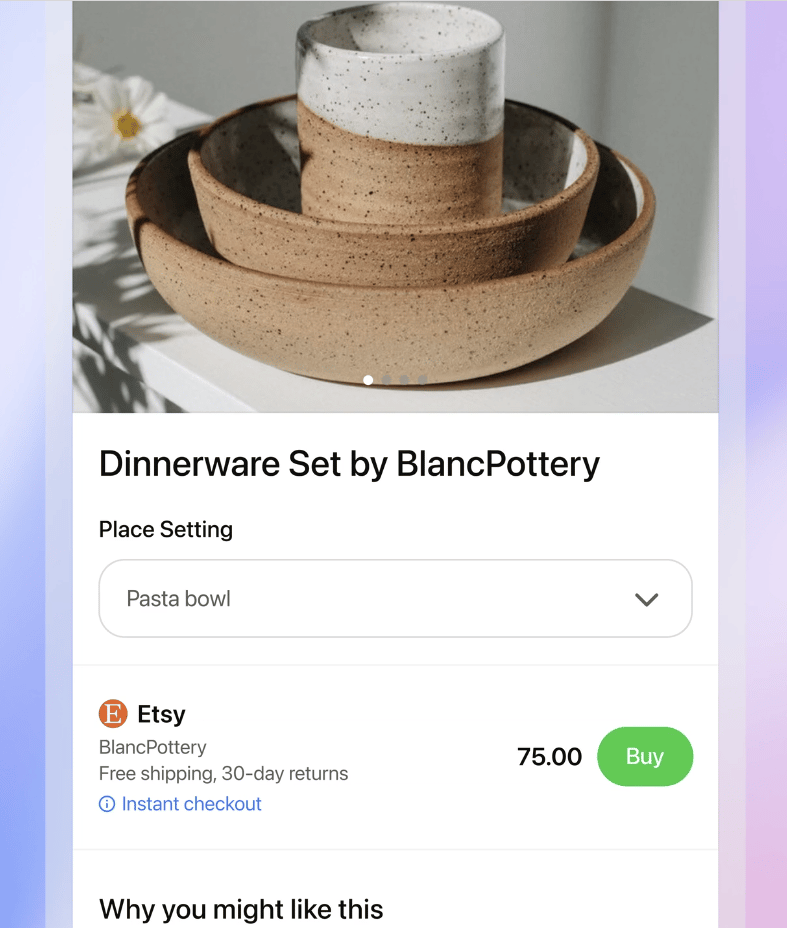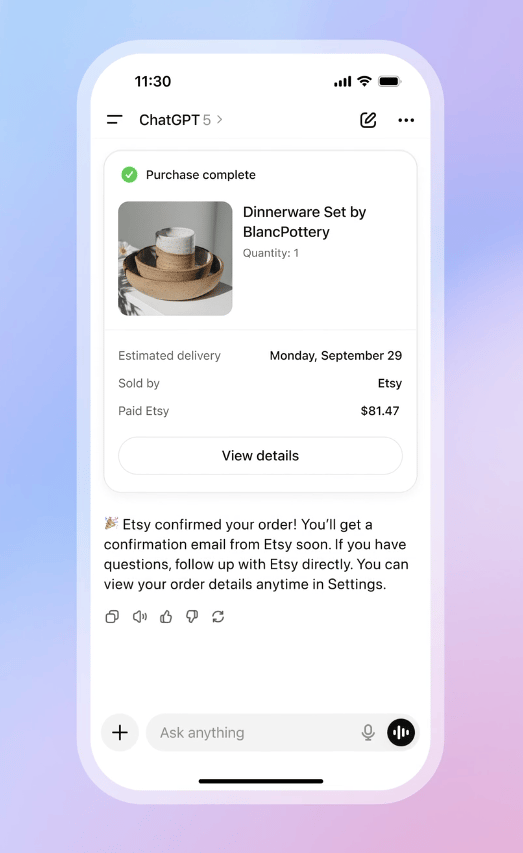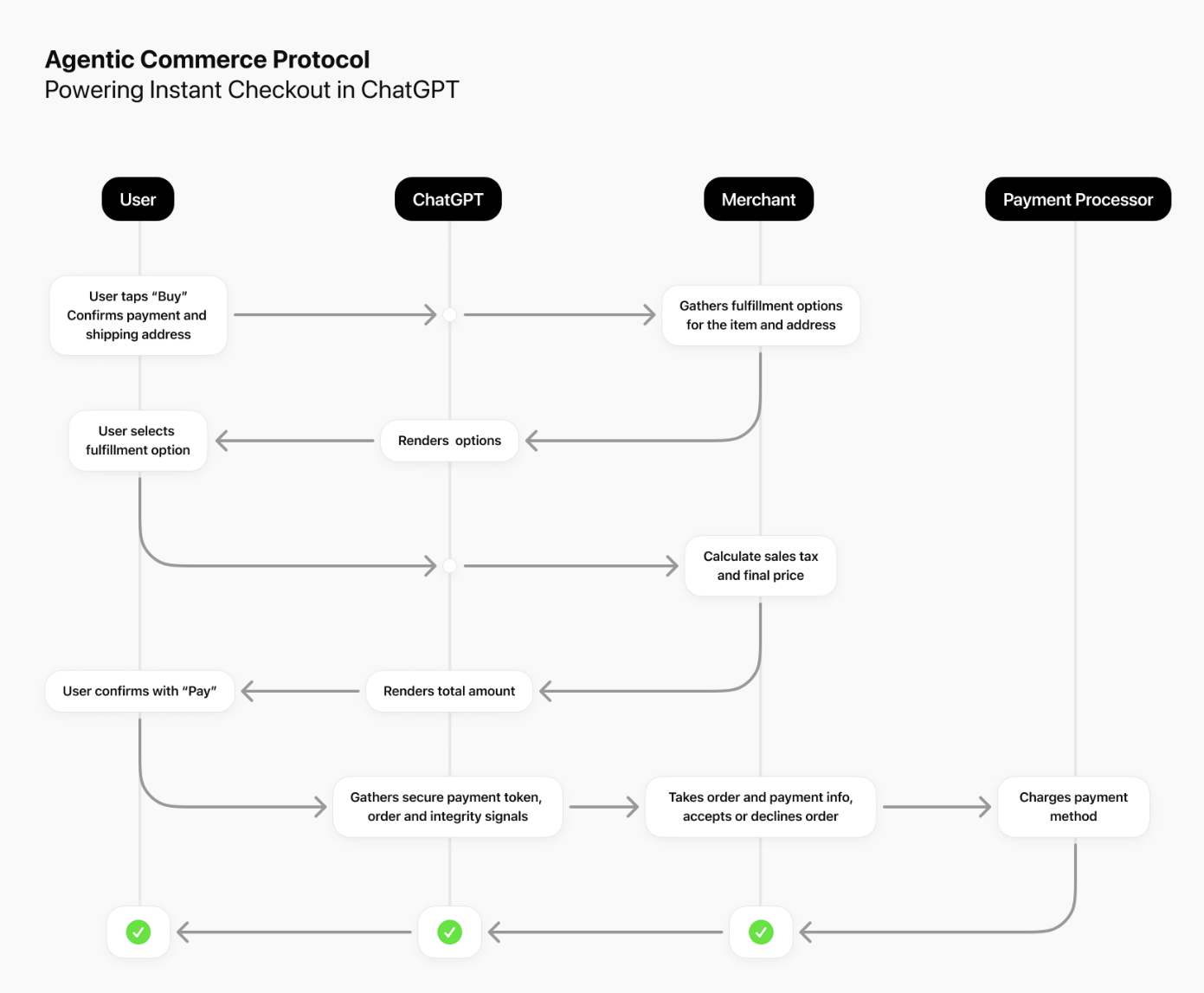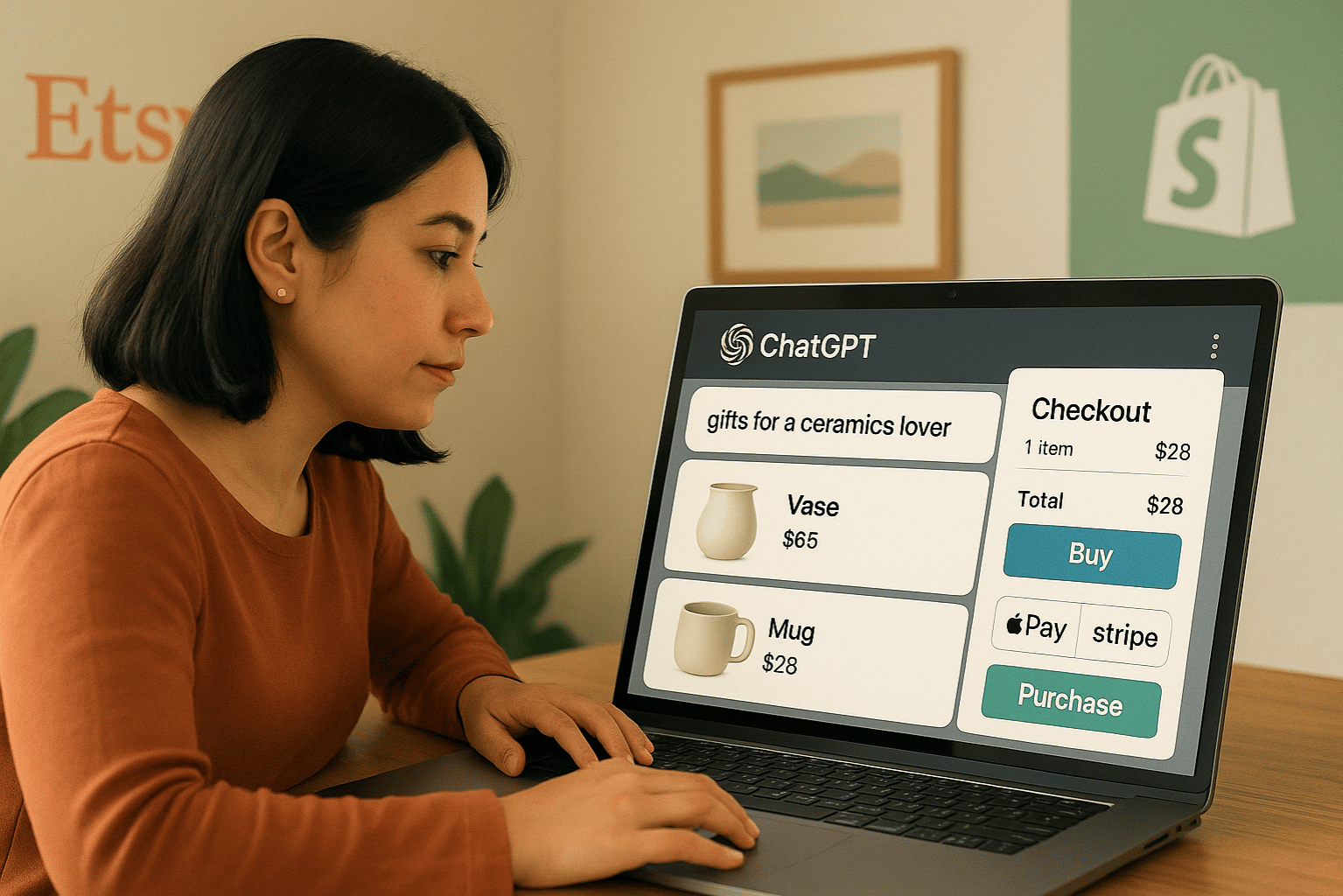
A woman shops with ChatGPT’s new Instant Checkout feature, which enables secure purchases from Etsy and Shopify merchants directly within the conversation. Image Source: ChatGPT-5
ChatGPT Launches Instant Checkout with Stripe and Etsy, Shopify Integration Coming Soon
Key Takeaways: AI Commerce, Instant Checkout, and OpenAI’s Expansion
OpenAI launched Instant Checkout in ChatGPT, starting with U.S. Etsy sellers and expanding soon to over 1 million Shopify merchants, including Glossier, SKIMS, Spanx, and Vuori.
The service is powered by the Agentic Commerce Protocol (ACP), an open standard for AI-driven commerce co-developed with Stripe.
Stripe’s role positions it as a core enabler of AI commerce infrastructure, simplifying merchant integration and payment processing.
Product rankings remain organic and unsponsored, with no preferential placement for Instant Checkout.
Merchants pay only a small fee on completed purchases; users pay nothing extra, and product pricing remains unaffected.
ACP is open-sourced, making it available to merchants and developers worldwide.
ChatGPT Shopping: From Discovery to Purchase
OpenAI is launching Instant Checkout in ChatGPT, giving users the ability to buy products directly inside conversations.
More than 700 million people use ChatGPT weekly, often for product recommendations. Until now, shoppers had to leave the chat to complete purchases. Instant Checkout now allows them to move from conversation to confirmation in just a few taps.
The feature is initially available for Etsy sellers in the U.S., accessible to U.S.-based Free, Plus, and Pro ChatGPT users. More than 1 million Shopify merchants — from indie brands to household names like Glossier, SKIMS, Spanx, and Vuori — are set to join soon, expanding the product range available within ChatGPT.
OpenAI co-developed Instant Checkout with Stripe, ensuring secure payments and easy merchant integration.
“Stripe is building the economic infrastructure for AI. That means re-architecting today’s commerce systems and creating new AI-powered experiences for billions of people. We’re proud to power Instant Checkout in ChatGPT and co-develop the Agentic Commerce Protocol to help businesses and AI platforms build the future of commerce,” said Will Gaybrick, President, Technology and Business, Stripe.
This launch marks the next step in agentic commerce, where ChatGPT moves beyond product discovery to completing purchases. For users, the experience is seamless — shifting from chat to checkout in just a few taps. For merchants, it opens access to hundreds of millions of shoppers while preserving full control over payments, fulfillment, and customer relationships.
By the Numbers
700M people use ChatGPT weekly for everyday tasks (OpenAI).
More than 1 million Shopify merchants will be available through Instant Checkout (OpenAI).
U.S. Etsy sellers are the first merchants integrated into ChatGPT (OpenAI).
How Instant Checkout Works: From Search to Secure Purchase
When a user asks a shopping-related question — such as “best running shoes under $100” or “gifts for a ceramics lover” — ChatGPT displays relevant products from across the web. OpenAI emphasizes that results are organic and unsponsored, with no influence from payments or promotions, ranked solely on relevance to the user.
If a product supports Instant Checkout, users can:
Tap “Buy” on the selected item.
Confirm shipping and payment details within ChatGPT.
Complete checkout directly in the chat — with payment options including saved cards, Apple Pay, Google Pay, Stripe, or credit card payments.
When multiple merchants sell the same product, ChatGPT considers:
Availability of the product
Price
Quality
Whether the seller is the primary merchant
Whether Instant Checkout is enabled
This ranking approach ensures shoppers see the most relevant and reliable options, not results shaped by paid promotions.
Merchants pay only a small fee on completed purchases, similar to the processing fees charged on traditional credit card transactions. For shoppers, Instant Checkout is free to use, does not alter product pricing, and does not give preferential treatment to participating merchants.
Orders, payments, and fulfillment are all handled by the merchant’s existing systems. ChatGPT functions as the intermediary agent — securely passing information between shopper and seller, similar to a digital personal assistant.
The Agentic Commerce Protocol: Open-Sourced for Global Adoption
At the center of Instant Checkout is the Agentic Commerce Protocol (ACP), co-developed with Stripe and designed as an open standard for AI-driven commerce.
When a shopper places an order, ChatGPT securely passes the details to the merchant via ACP. The merchant then confirms the order, processes payment through their existing provider, and manages fulfillment and customer support as they normally would.
OpenAI has open-sourced ACP, making it available for widespread adoption by merchants and developers. The protocol is built to:
Work across platforms, payment processors, and business types
Integrate quickly, without requiring backend overhauls
Keep merchants in control of the customer relationship as the merchant of record across the purchase journey — from fulfillment and returns to support and communication
OpenAI has also published documentation for the Agentic Commerce Protocol, inviting interested merchants and developers to begin experimenting with integrations and apply to make their products available for purchase through ChatGPT.
Integration is also designed to be straightforward. Merchants already using Stripe can enable ACP with as little as one line of code. Those using other payment processors can still participate by connecting through Stripe’s Shared Payment Token API or by adopting ACP’s Delegated Payments Spec without changing their existing payment processor — both approaches allow merchants to integrate without disrupting existing systems.
Etsy’s Chief Product & Technology Officer, Rafe Colburn, said: “It’s Etsy’s job to help shoppers discover special items our sellers offer—even when they don’t think to come to Etsy. ChatGPT helps us meet buyers where they are.”
Shopify’s VP of Product, Vanessa Lee, added: “Bringing Shopify merchants into ChatGPT lets indie brands to household names reach customers in entirely new ways, meeting high-intent shoppers in relevant conversations.”
Industry Implications: A Shift in E-Commerce Power
According to TechCrunch, OpenAI’s entry into transactional shopping could reshape the balance of power in e-commerce. For years, Google and Amazon have been the primary gatekeepers of retail discovery, often leveraging their dominance to prioritize their own products or preferred partners, while charging steep fees to sellers simply to maintain visibility.
If AI chatbots become the first stop for online purchases, companies like OpenAI could gain influence over which products are surfaced, how they are ranked, and what commissions or fees are applied. This would mark a significant change in the structure of online retail, shifting consumer attention and merchant dependence away from search engines and marketplaces toward conversational agents.
Perplexity AI has already been testing this model. In 2024 it rolled out in-chat shopping for U.S. Pro users and later partnered with PayPal to enable direct checkout with options like Venmo. Reports suggest that its shopping interface appears in 92% of user prompts, heavily steering queries toward commerce. At the same time, Perplexity now processes more than 100 million queries per week overall, giving it a substantial base to experiment with in-chat shopping. This approach emphasizes speed to market and leveraging an established payments ecosystem.
By contrast, OpenAI is taking a more infrastructure-focused route. It has co-developed the Agentic Commerce Protocol with Stripe and open-sourced it, positioning ACP as a standard for AI commerce. Rather than just integrating payments, this approach aims to create a foundation that can work across processors, platforms, and merchants at global scale.
Competition in this space is intensifying. Microsoft is piloting storefront capabilities in its Copilot Merchant Program, and Google recently introduced its own Agent Payments Protocol (AP2). Together, these developments point to a new race among AI platforms to become the central discovery and checkout layer of e-commerce.
If widely adopted, this type of frictionless, in-chat shopping could spark a new movement in how people shop online — shifting behavior away from search engines like Google and marketplaces like Amazon toward conversational agents that offer personalized, curated recommendations, product comparisons, and seamless checkout based on a user’s needs.
Built for Trust: User Control and Security
OpenAI has emphasized that Instant Checkout is designed around trust and safety:
Users remain in control — each purchase requires explicit confirmation before any action is taken.
Payments are encrypted and tokenized for specific merchants and amounts and are only completed with the user’s permission.
Minimal data sharing ensures only necessary order details are passed to the merchant.
Q&A: ChatGPT Instant Checkout
Q: What is Instant Checkout in ChatGPT?
A: Instant Checkout allows ChatGPT users to buy directly from merchants like Etsy and soon Shopify, without leaving the chat.
Q: Who can use Instant Checkout right now?
A: It’s available to U.S.-based Free, Plus, and Pro ChatGPT users, starting with Etsy sellers.
Q: What is the Agentic Commerce Protocol (ACP)?
A: ACP is an open standard co-developed by OpenAI and Stripe that enables secure AI-driven transactions between users and businesses.
Q: How does OpenAI rank products in ChatGPT?
A: Products are ranked organically by relevance, not by payments. Ranking factors include price, quality, availability, seller status, and Instant Checkout support.
Q: What fees apply to Instant Checkout?
A: Merchants pay a small fee on completed purchases. For shoppers, the service is free and product pricing remains unchanged.
What This Means: AI Becomes a Shopper
The launch of Instant Checkout is more than just a new feature — it marks the first time ChatGPT can complete purchases directly inside a conversation. Perplexity has leaned on PayPal to enable in-chat purchases, emphasizing speed and ease of integration. OpenAI, by comparison, is taking a more ambitious approach with Stripe — not just adding payments, but building and open-sourcing an industry protocol that could serve as the foundation for AI-driven commerce across platforms. OpenAI’s move also brings the concept to a much larger audience. With hundreds of millions of weekly users, this shift signals that conversational commerce is advancing from early experiments into mainstream adoption — with ChatGPT evolving from a recommendation tool into a transactional agent on behalf of users.
That step is significant. If conversational AI becomes the new interface for shopping, it could reshape consumer habits, merchant strategies, and the broader balance of power in e-commerce. The companies controlling these AI agents may soon have as much influence over retail discovery and spending as search engines and marketplaces do today.
At the same time, the decision to open-source the Agentic Commerce Protocol lays groundwork for a more open ecosystem, one where merchants can integrate without losing control of their customers or payments.
For shoppers, this means AI can now handle the entire journey — from finding to buying — in a secure and frictionless way. For merchants, it creates a direct channel to high-intent buyers, without relying solely on existing gatekeepers like Amazon or Google.
It’s a small step in functionality, but a big leap in what AI can do for everyday life.
Editor’s Note: This article was created by Alicia Shapiro, CMO of AiNews.com, with writing, image, and idea-generation support from ChatGPT, an AI assistant. However, the final perspective and editorial choices are solely Alicia Shapiro’s. Special thanks to ChatGPT for assistance with research and editorial support in crafting this article.

